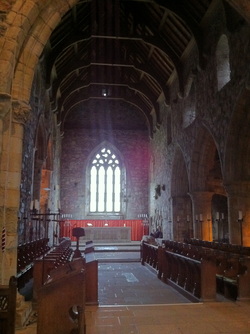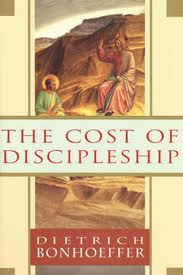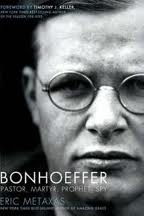
 At the service last night at the Abbey the leader offered a few words about Bonhoeffer and then invited us to light a candle and place it in one of the candle holders that were arranged on the floor in the shape of a cross. Our candle was to honor someone in our life who exemplified courage and commitment to do God’s work in the world. I immediately thought of my mom, who is still showing us that we should never give up. Mom has always given herself to others and she still showing us how.
0 Comments
 Those who wish even to focus on the problem of a Christian ethic are faced with an outrageous demand—from the outset they must give up, as inappropriate to this topic, the very two questions that led them to deal with the ethical problem: ‘How can I be good?’ and ‘How can I do something good?’ Instead they must ask the wholly other, completely different question: ‘What is the will of God?’ Deitrich Bonhoeffer I was jolted by these words of Bonhoeffer while reading, “Bonhoeffer: Pastor, Martyr, Prophet, Spy,” by Eric Metaxas, and they have continued to bounce around in my mind--one layer of meaning sparing against another. As a start, Bonhoeffer reminds me how essential and challenging it is to ask the right question. Case in point: “How can I be a good?” “How can I do something good?” are straight from the ego. I immediately respond, “Not to worry, I can figure out what a good person should do, and more specifically what I should do.” Then I notice that in my response I have grabbed the role of director from God. Next I notice that my answer includes that problematic word, ‘should’. Clearly I’m off track here. “No, no, no,” says Bonhoeffer, “God is the director. Try this one. ‘What does God want you to do?’” Immediately the question shifts from worldly ‘shoulds’ to God “shoulds’. I’m beginning to hear that I ‘should’ listen to God’s response. I have a log way to go on all of this, this listening to God, but I’m trying. I do it through all kinds of praying, such as talking with God, centering prayer, and reading scripture. I do it sitting, walking, and listening to music. I do it in solitude, with family and friends and at church. I’ll try anything that sounds like God’s will for me.  I have finished the biography of Bonhoeffer * and have located my copy of his The Cost of Discipleship, which I have begun reading very slowly, like a meditation. I can’t get Bohoeffer’s phrase “cheap grace” out of my mind. What a apt phase—wham, right in-my-face. No way should I take God’s grace for granted and just go along my merry way. Once I admit God’s grace in my life, responsibility follows. How can I possibly think that God cares whether we have a sunny day for the July 4th parade and picnic? Bohoeffer spent a great deal of time thinking and praying. That’s what I’m doing about all of this. * Bonhoeffer: Pastor, Martyr, Prophet, Spy,” by Eric Metaxas  I highly recommend the book I’m currently reading: “Bonhoeffer: Pastor, Martyr, Prophet, Spy,” by Eric Metaxas. The 182 out of 542 pages that I’ve read so far have been inspiring on all accounts—theologically, socially, historically and politically. One of Bonhoeffer themes is to define “church”. For as long as I can remember, church has always been Jesus’ church, “the body of Christ,” never a national or denominational church. But back in the 1930’s the idea of “The Church of Jesus Christ,” was one that was being worked out, particularly by Bonhoeffer. The Nazis had just come to power and were using the church to their ideological advantage. Bonhoeffer, citing Scripture, spoke of the church as universal, not as national, nor as German. “There is neither Jew nor Greek, slave nor free, male nor female, for you are all one in Christ Jesus” Gal. 3.28. Today we are still grappling with this; people and institutions are still using the church for political advantage. Two days in a row now, the Boston Globe has brought to our attention how, in the name of Jesus, the organized church is still trying to exclude people. Following Bonhoeffer prophetic message, Rev. John Unni, priest of St. Cecilia’s Church in Boston, is welcoming all of God’s children to God’s table; all, including gays and lesbians. Recently, while receiving hate mail, Father Unni thought about Jesus’ message to turn the other cheek. “I started praying for these people. But it happened to me. The energy in me changed. Even if you disagree with someone, why would you be hateful?” Again, I am reminded how very central prayer is to the Christian faith. We need to continue to pray, “not my will but thy |
Contact me
bobbifisher.mac@mac.com Archives
August 2023
Categories
All
|
 RSS Feed
RSS Feed